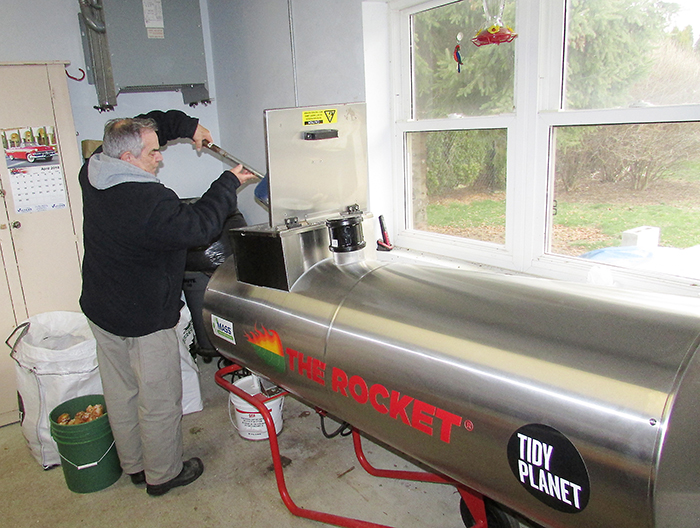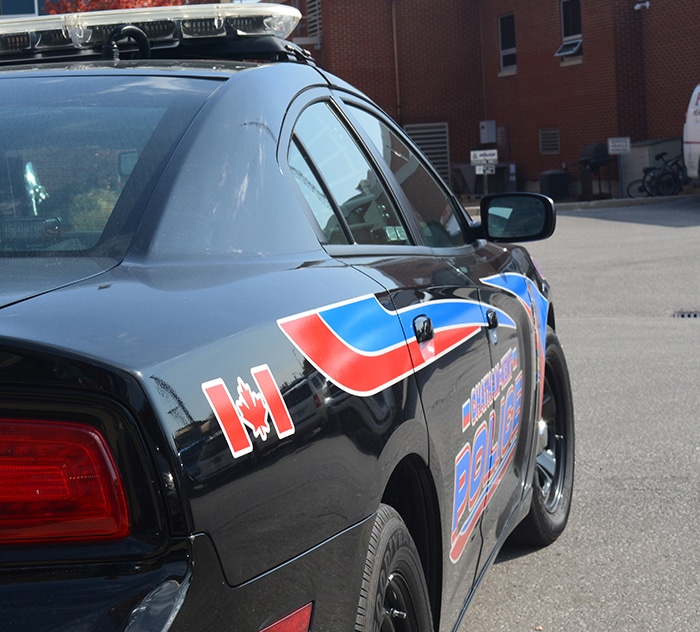
The Rocket officially launched April 19, but no need to look skyward.
The Rocket is Villa Angela’s large-scale composter. It is being utilized to turn food waste – including meat – into rich compost that is to be used by the Villa and Chatham-Kent Community Gardens.
At the Rocket’s unveiling April 19, Sister Theresa Campeau said it’s all part of the Ursuline Sisters’ commitment to the environment.
“We Ursuline Sisters are looking to make as small a carbon footprint as possible,” she said, adding the villa has solar panels and even utilizes geothermal energy.
Villa Angela is home to approximately 50 residents.
Before they added the Rocket to their arsenal, the sisters conducted a review of their waste produced.
Sister Anne Denomy said a waste audit of all the solid non-hazardous materials collected at the Villa was conducted, and the sisters happily learned they were “saving” about 30 trees a year with their recycling. But all the news was not good.
“We found our total waste production/diversion rate was 32 per cent. We needed to do much better,” she said.
Composters built with the assistance of students of Ursuline College Chatham helped, but Denomy said those were filled within a matter of weeks.
They looked for help, and received it. Mass Environmental Services introduced them to the Rocket, a metal cylindrical composter that can digest food scraps and produce rich compost in 14 days.
With the Rocket, the villa’s waste diversion rate is now at about 70 per cent.
Campeau said the Rocket has altered how the sisters look at things.
“It’s helped us change our perspective on what is garbage,” she said. “We can share this rich resource with Chatham-Kent Community Gardens. The compost is black gold in terms of enriching the soil. Who could have guessed our garbage could be of value for the citizens of Chatham-Kent?”
Lindsay Davidson with the Chatham-Kent Public Health Unit said the compost would be in high demand with the community gardens.
“To get the best fruits and vegetables, you need that black gold,” she said. “To get all that compost is a huge benefit to us.”
George Brown of Mass Environmental said the effort by the Ursuline sisters as a team to tackle any issue is amazing.
“I’m blown away by how this team here takes ownership of everything they do. We can all make a difference,” he said.
Brown said food waste that’s discarded into landfills produces methane gas as it breaks down. Methane is about 25 times stronger than carbon dioxide in terms of greenhouse gas emissions.
And it adds up fast.
“Thirteen million tonnes of food waste is sent to landfills in Canada each year,” he said. “Turning organic waste into compost is good for us all.”
The Rocket is located in the garage at Villa Angela, at the back of the property. There is a slight odour coming from the composter, but nothing overwhelming.
Brown said the composter works best between 55C and 65C internal temperature. It uses electricity to run an auger that constantly turns the material, and heats it as necessary.
The warm operating temperature ensures the microorganisms breaking down the material can work at optimum capacity.
Food waste from meal preparation, and table scraps afterwards, are fed into the Rocket, along with a bulking agent – wood chips.
While outdoor backyard composters come with the recommendation to not include meat scraps, as they can attract animals and give off a foul odor, Brown said the Rocket’s temperature and agitation system quickly break down the meat, and add protein to the compost produced.





